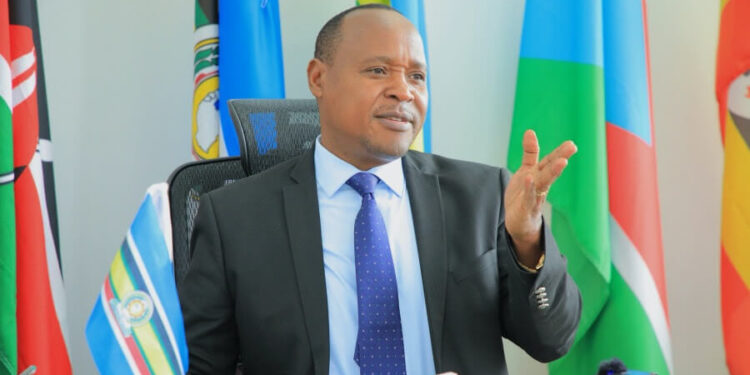Intra – East African Community (EAC) trade increased by 13.4 percent to $74.1 billion in 2022 from $65.3billion in 2021, while the total Intra-EAC trade grew by 11.2 percent to $10.9billion in 2022 from $9.8 billion in 2021.
The East African Community (EAC) Secretary General Dr.Peter Mathuki made the revelation while delivering the annual State of the EAC Address at the EAC Headquarters in Arusha, Tanzania.
According to him, the percentage share of Intra-EAC trade to EAC total trade stood at 15 percent in 2022, and 2023 has indicated a positive trend with 16% in January and 19% in February recorded of total EAC trade.
“The increase is attributed to a strong collaboration with Partner States to promote EAC trade including admission of DRC, timely resolution of Non-Tariff Barriers, enhanced trade facilitation initiatives, harmonization of 2,568 East African standards (Partner States have adopted the EAC Harmonized Standards, ranging from 77% to 91% as of June 2023), promotion of Micro, Small and Medium Enterprises through the Annual EAC MSMEs Trade Fair (Jua Kali Nguvu Kazi exhibition), sensitisation and capacity building of relevant stakeholders, among other things,” he said.

Dr Mathuki said that the implementation of the Single Customs Territory, which is a stop gap measure towards the realisation of a fully-fledged Custom Union in the EAC, has seen a reduction in the turn-around time from an average of 21 days to four (4) days along the EAC corridors.
“About 95% of the EAC Customs regimes including imports and exports have been operationalised with transit being piloted. The average transit time from the main EAC Ports of Entry (Dar es Salaam and Mombasa) to the exit borders reduced from 86.16 hours (3.59 days) to 81.84 hours (3.2 days) in 2022,” said the SG, adding that a comprehensive review of the EAC Customs Management Act, 2004 was also finalised to enhance the operations of the Single Customs territory.
“The operationalisation of additional OSBPs with non-EAC countries Tunduma / Nakonde (Zambia/Tanzania), Moyale/Moyale (Ethiopia/Kenya), and Kasumulu / Songwe (Tanzania/Malawi) has led to a reduction in cross border clearance time by 80%,” he added.
On the Common Market Protocol, Dr. Mathuki revealed that five (5) out of the seven (7) EAC Partner States commenced the issuance of the EA e-Passport to facilitate the free movement of persons across the region.
“To facilitate the free movement of services, the Community adopted and is implementing a Mechanism for Removal of Restrictions in trade in services with the aim of identifying and monitoring the removal of restrictions in service sectors,” said Dr. Mathuki.
The Secretary General said that to facilitate the right of establishment, the Community adopted and is implementing the EAC Private Sector Development Strategy – to catalyse investment and business promotion in the region.
“In July 2022, EAC Heads of State convened in Arusha and discussed the progress made in implementing the Common Market Protocol and identified areas that need to be prioritized to ensure that the Common Market is fully operational, namely the: One Network Area and an Open Skies policy,” he said.
Dr. Mathuki said that the High-Level Retreat preceding the Ordinary Meeting of the Summit will focus on infrastructure development as a catalyst for regional integration.
On the Monetary Union Protocol, the Secretary General said that in addition to the establishment of the East African Monetary Institute, Bills for the establishment of the EAC Bureau of Statistics, the East African Surveillance, Compliance and Enforcement Commission, and the East African Financial Services Commission have been passed by the EALA and are currently awaiting assent by EAC Heads of State.
“The 43rd Ordinary Meeting of the Council of Ministers that met in Bujumbura, Burundi from 19th – 23rd February, 2023, adopted the revised roadmap for the realization of the East African Monetary Union. While the roadmap has 2031 as the year for the adoption of the EAC single currency, we encourage Ministers of Finance to urgently reconsider working towards providing a common currency in the next three (3) years,” he said.







